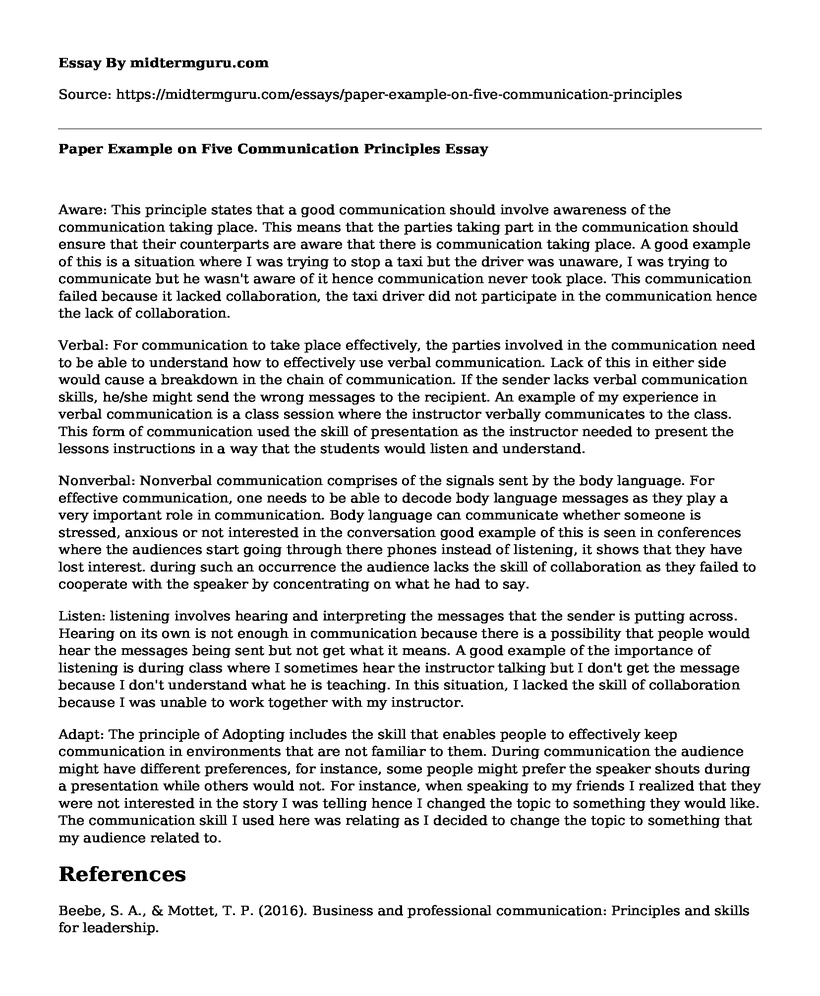Aware: This principle states that a good communication should involve awareness of the communication taking place. This means that the parties taking part in the communication should ensure that their counterparts are aware that there is communication taking place. A good example of this is a situation where I was trying to stop a taxi but the driver was unaware, I was trying to communicate but he wasn't aware of it hence communication never took place. This communication failed because it lacked collaboration, the taxi driver did not participate in the communication hence the lack of collaboration.
Verbal: For communication to take place effectively, the parties involved in the communication need to be able to understand how to effectively use verbal communication. Lack of this in either side would cause a breakdown in the chain of communication. If the sender lacks verbal communication skills, he/she might send the wrong messages to the recipient. An example of my experience in verbal communication is a class session where the instructor verbally communicates to the class. This form of communication used the skill of presentation as the instructor needed to present the lessons instructions in a way that the students would listen and understand.
Nonverbal: Nonverbal communication comprises of the signals sent by the body language. For effective communication, one needs to be able to decode body language messages as they play a very important role in communication. Body language can communicate whether someone is stressed, anxious or not interested in the conversation good example of this is seen in conferences where the audiences start going through there phones instead of listening, it shows that they have lost interest. during such an occurrence the audience lacks the skill of collaboration as they failed to cooperate with the speaker by concentrating on what he had to say.
Listen: listening involves hearing and interpreting the messages that the sender is putting across. Hearing on its own is not enough in communication because there is a possibility that people would hear the messages being sent but not get what it means. A good example of the importance of listening is during class where I sometimes hear the instructor talking but I don't get the message because I don't understand what he is teaching. In this situation, I lacked the skill of collaboration because I was unable to work together with my instructor.
Adapt: The principle of Adopting includes the skill that enables people to effectively keep communication in environments that are not familiar to them. During communication the audience might have different preferences, for instance, some people might prefer the speaker shouts during a presentation while others would not. For instance, when speaking to my friends I realized that they were not interested in the story I was telling hence I changed the topic to something they would like. The communication skill I used here was relating as I decided to change the topic to something that my audience related to.
References
Beebe, S. A., & Mottet, T. P. (2016). Business and professional communication: Principles and skills for leadership.
Cite this page
Paper Example on Five Communication Principles. (2022, Aug 17). Retrieved from https://midtermguru.com/essays/paper-example-on-five-communication-principles
If you are the original author of this essay and no longer wish to have it published on the midtermguru.com website, please click below to request its removal:
- America's Color Line: How Immigration and Intermarriage Shifted the Landscape - Essay Sample
- Immigration: Shaping America's History and Divisive Politics - Essay Sample
- Female Chauvinism: Discrimination Against Men in Contemporary Society - Essay Sample
- Psychopathy, Criminality & Society: How Anti-Socialism Breeds Abnormality - Essay Sample
- Understanding Sexual Consent: An Essential Part of Relationships - Research Paper
- Paper Example on Adoption in LGBT Families
- Helping the Less Fortunate: A Promise I Made to Myself - Essay Sample







